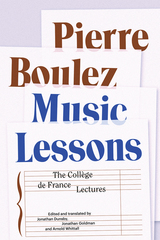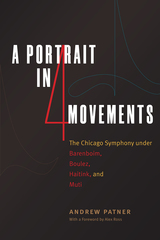

Including a foreword by famed semiologist Jean-Jacques Nattiez, who was for years a close collaborator and friend of the composer, this edition is also enriched by an illuminating preface by Jonathan Goldman. With a masterful translation retaining Boulez’s fierce convictions, cutting opinions, and signature wit, Music Lessons will be an essential and entertaining volume.

Pierre Boulez is one of the most influential—and controversial—figures in the world of contemporary music. As composer, conductor, and critic, his challenging views of modern developments are lent a special authority by his high standing as an interpreter of classic composers. Orientations will enhance his reputation as a lucid expositor of the modern composer's world.
When writing about composing and analysis Boulez forges a new way of thinking about music. He is immensely illuminating about his own compositions. He offers special insight on composers with whom he has been particularly associated as a conductor—including Berlioz, Debussy, Wagner, Mahler, Schoenberg, Stravinsky, and Messiaen. And he writes about performance and orchestras, tackling the question of how to make new music more familiar for the concert-goer. This rich and wide-ranging volume is truly a special resource for everyone wanting to learn more about twentieth-century music.

This first thorough biography of the gifted Pierre Boulez interrelates four major aspects of his professional life: as composer, as conductor, as polemicist for new music, and as musico-political entrepreneur. Lively, intimate, and knowledgeable, it will fascinate concertgoers and students of contemporary music, and will be an especially valuable handbook for those who own recordings of the music. Dominique Jameux develops a comprehensive life history of Boulez, marking all the milestones. We observe the composer at study and at work: the relationship—personal and intellectual—between Boulez and Messiaen; the organization of the Domaine Musical concerts for performance of avant-garde music as well as the launching of IRCAM, an institute for experiments with new musical techniques; Boulez’s teaching experiences, particularly at Darmstadt and Harvard; his discussions with other composers; and his seasons as conductor of the New York Philharmonic, of the BBC Symphony, and of Wagner at Bayreuth.
Many major artistic names figure in this story—Messiaen, Cage, Stockhausen, Maderna, the conductor Rene Leibowitz, the actor Jean-Louis Barrault, as well as several great performers. In Part II, Jameux discusses in detail twelve representative compositions, ranging from the flute sonatina of 1946 to Répons. Throughout the preparation of this book, Jameux had the advantage of interviews with Boulez, along with many informal meetings; the result of the author’s direct contact with his subject is a lucid and reliable introduction to the music, ideas, and activities of one of the leading musical thinkers and doers of our day.

The Chicago Symphony Orchestra has been led by a storied group of conductors. And from 1994 to 2015, through the best work of Daniel Barenboim, Pierre Boulez, Bernard Haitink, and Riccardo Muti, Andrew Patner was right there. As a classical music critic for the Chicago Sun-Times and WFMT radio, Patner was able to trace the arc of the CSO’s changing repertories, all while cultivating a deep rapport with its four principal conductors.
This book assembles Patner’s reviews of the concerts given by the CSO during this time, as well as transcripts of his remarkable radio interviews with these colossal figures. These pages hold tidbits for the curious, such as Patner’s “driving survey” that playfully ranks the Maestri he knew on a scale of “total comfort” to “fright level five,” and the observation that Muti appears to be a southpaw on the baseball field. Moving easily between registers, they also open revealing windows onto the sometimes difficult pasts that brought these conductors to music in the first place, including Boulez’s and Haitink’s heartbreaking experiences of Nazi occupation in their native countries as children. Throughout, these reviews and interviews are threaded together with insights about the power of music and the techniques behind it—from the conductors’ varied approaches to research, preparing scores, and interacting with other musicians, to how the sound and personality of the orchestra evolved over time, to the ways that we can all learn to listen better and hear more in the music we love. Featuring a foreword by fellow critic Alex Ross on the ethos and humor that informed Patner’s writing, as well as an introduction and extensive historical commentary by musicologist Douglas W. Shadle, this book offers a rich portrait of the musical life of Chicago through the eyes and ears of one of its most beloved critics.
READERS
Browse our collection.
PUBLISHERS
See BiblioVault's publisher services.
STUDENT SERVICES
Files for college accessibility offices.
UChicago Accessibility Resources
home | accessibility | search | about | contact us
BiblioVault ® 2001 - 2024
The University of Chicago Press









